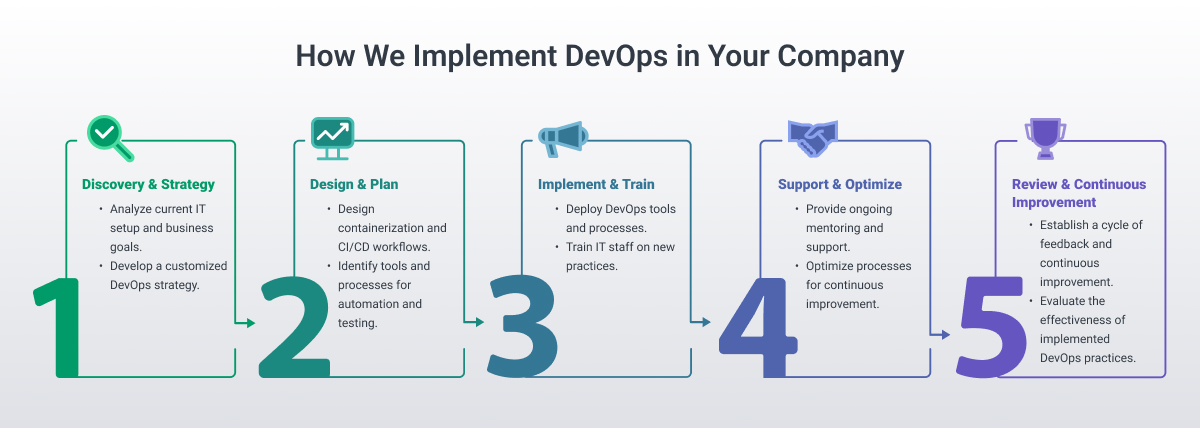In the fast-paced world of startups, leveraging the right strategies to streamline development processes and enhance product quality is crucial.
One such strategy is DevOps, a methodology that bridges the gap between development (Dev) and operations (Ops) teams, fostering collaboration, increasing efficiency, and accelerating time-to-market.
Here's a comprehensive guide on how DevOps can help startups achieve rapid growth and success.

What is DevOps and Why is it Important for Startups?
Understanding the Concept of DevOps
DevOps is more than just a set of practices; it's a cultural shift that encourages collaboration, communication, and continuous improvement. By integrating development and operations, DevOps benefits businesses by delivering high-quality products faster and more efficiently.
How DevOps Practices Can Transform Startup Development Processes
DevOps practices can revolutionize startup development processes by fostering a culture of collaboration, automation, and continuous improvement.
By integrating development and operations teams, automating repetitive tasks, and utilizing CI/CD pipelines, startups can streamline workflows, reduce bottlenecks, accelerate product delivery, and remain agile and competitive.
Ultimately, adopting DevOps practices empowers startups to build, test, and deploy high-quality software swiftly, driving growth and customer satisfaction.
.jpg)
Benefits of DevOps Adoption for Startups
With a better understanding of DevOps in mind, we'll explore the greatest benefits of DevOps for startups:
Enhanced Collaboration and Communication
DevOps breaks down silos between teams, promoting transparency and better communication. This collaborative approach leads to faster problem-solving, improved teamwork, and a more harmonious workplace. Tools like Slack, Jira, and Trello facilitate real-time communication and project management, ensuring everyone stays aligned and informed.
Optimizing Development and Operations Processes with DevOps
With DevOps, startups can automate manual tasks, streamline processes, and implement Continuous Integration and Continuous Delivery (CI/CD) pipelines. This results in faster and more frequent releases, allowing startups to bring products to market quickly.
Automated deployment reduces the risk of human error, ensuring that new features and updates are rolled out smoothly and efficiently.
Improved Product Quality
Automated testing and continuous monitoring are integral to DevOps, ensuring that code is thoroughly tested throughout the development lifecycle. This reduces the risk of bugs and improves overall product quality. By catching issues early in the development process, startups can save time and resources that would otherwise be spent on fixing problems post-release.
Scalability and Flexibility
Startups often experience rapid growth, and DevOps practices like Infrastructure as Code (IaC) enable seamless scalability. Tools like Terraform and Ansible allow startups to manage infrastructure programmatically, adapting to changing demands effortlessly. This flexibility ensures that startups can scale their operations quickly to meet increasing user demands without compromising performance.
Efficient Resource Utilization
Cloud services like AWS, Azure, and Google Cloud provide startups with cost-effective infrastructure solutions. By using these services, startups can optimize resource utilization, reduce costs, and avoid upfront investments. Pay-as-you-go models offered by cloud providers allow startups to only pay for the resources they use, providing financial flexibility and reducing waste.

Implementing DevOps: Challenges and Solutions
While the benefits of DevOps are clear, startups may face challenges in its implementation. Here are some common hurdles and strategies to overcome them:
Limited Resources
Startups often operate with budget constraints and limited human resources. To address this, prioritize critical areas for DevOps implementation and leverage cloud services to access scalable infrastructure without significant upfront costs. Focus on incremental improvements and gradually expand DevOps practices across the organization.
Lack of Expertise
DevOps requires specialized skills, which may be lacking in a startup team. Invest in training and upskilling team members, or seek external assistance from DevOps consultants to fill expertise gaps. Encourage a culture of continuous learning and provide access to resources such as online courses, workshops, and certification programs.
Organizational Resistance
Implementing DevOps involves a cultural shift that may face resistance. Communicate the benefits clearly to all stakeholders, foster a collaborative culture, and involve key decision-makers early in the process to gain buy-in and support. Address concerns and highlight how DevOps can improve productivity, quality, and overall business outcomes.
Legacy Systems and Processes
Integrating DevOps with legacy systems can be complex. Prioritize modernization efforts, gradually replace or refactor legacy components, and choose DevOps tools that integrate well with existing systems. Use strategies like the Strangler Pattern to incrementally replace legacy systems with new, modern applications without disrupting business operations.
Cultural Shift
DevOps is not just about tools and processes but also about fostering a culture of collaboration and continuous improvement. Encourage cross-functional collaboration, knowledge sharing, and open communication to create a supportive environment. Promote a blameless culture where failures are seen as learning opportunities rather than setbacks.

How to Successfully Implement DevOps in a Startup Setting
Implementing DevOps in a startup setting can be particularly challenging due to tight budgets, small in-house teams, and the necessity of planning for future scaling.
Despite these challenges, building a robust DevOps process is crucial for startups aiming to accelerate growth and remain competitive.
By adopting strategic approaches and leveraging appropriate tools, startups can successfully implement DevOps to enhance their development processes and prepare for scalable growth.
Key Strategies for Implementing DevOps in a Startup:
Implementing DevOps in a startup requires a strategic approach that includes fostering a collaborative environment, embracing automation, and focusing on continuous improvement. Key strategies include:
Embrace Automation
Automate repetitive tasks like building, testing, and deploying code changes to save time, reduce errors, and increase efficiency. Use tools like Jenkins, GitLab CI, and CircleCI to set up automated pipelines that handle these processes seamlessly.
Implement CI/CD
Continuous Integration and Continuous Delivery are fundamental to DevOps, enabling frequent code integration and automated deployments, which minimize downtime and accelerate time-to-market. CI/CD pipelines ensure that every code change is automatically tested and deployed, reducing the risk of integration issues and deployment failures.
Leverage Infrastructure as Code (IaC)
Use IaC to manage and provision infrastructure resources through code, ensuring consistency, reducing manual errors, and enabling scalable environments. IaC tools like Terraform and CloudFormation allow you to define infrastructure in code, making it easy to replicate environments and manage infrastructure changes.
Adopt Containerization
Technologies like Docker allow startups to package applications and their dependencies into lightweight, portable containers, simplifying deployment and improving resource utilization. Containers ensure consistency across different environments, from development to production, and make scaling applications easier.
Monitor and Measure
Implement robust monitoring and measurement practices to gain visibility into application performance, identify bottlenecks, and enable continuous improvement. Use monitoring tools like Prometheus, Grafana, and the ELK stack (Elasticsearch, Logstash, Kibana) to track metrics, analyze logs, and gain insights into system performance.
DevOps as a Service
Partnering with experienced DevOps implementation services can provide startups with the expertise and support necessary to navigate their DevOps journey successfully. These services help startups overcome common challenges such as limited budgets, small in-house teams, and the need for scalable solutions.

What Are the Best DevOps Practices for Startups?
To maximize the benefits of DevOps, startups should adopt specific best practices:
Continuous Learning and Improvement
Encourage a culture of continuous learning, regular retrospectives, and knowledge-sharing sessions to identify areas for improvement and refine DevOps practices over time. Embrace a mindset of experimentation and iterative improvement, allowing teams to learn from both successes and failures.
Foster Collaboration and Communication
Use collaborative tools like Slack, Microsoft Teams, and Jira to facilitate seamless communication, ensuring all team members are aligned and working towards common goals. Regular stand-up meetings, retrospectives, and cross-functional team activities help maintain a collaborative culture.
Prioritize Security
Integrate security into the development process (DevSecOps), perform automated security testing, and regularly update dependencies and patches to ensure application security. Tools like Snyk, Aqua Security, and Clair can help automate security checks and vulnerability scanning.

Developing a DevOps Culture within a Startup
Developing a DevOps culture within a startup involves promoting collaboration, accountability, and a mindset geared toward continuous improvement. This can include:
- Encouraging a shared responsibility for the software development lifecycle.
- Fostering a culture of open communication where team members feel comfortable sharing ideas, feedback, and challenges.
- Providing training and resources to help team members understand and adopt DevOps principles and practices.
- Celebrating successes and learn from failures to create an environment that values experimentation and innovation.
By cultivating a DevOps culture, startups can build a foundation of trust, collaboration, and continuous learning that supports their growth and success.
Tools and Technologies for DevOps Implementation in Startups
Selecting the right tools and technologies is crucial for successful DevOps implementation in startups.
Popular tools for version control, such as Git, enable efficient collaboration and code management.
Continuous integration tools like Jenkins, CircleCI, or Travis CI automate testing and integration processes, ensuring code quality and reducing the risk of integration issues.
Containerization technologies like Docker and orchestration tools like Kubernetes help streamline the deployment and scaling of applications.
Monitoring and logging tools, such as Prometheus and ELK Stack, provide visibility into system performance and facilitate proactive issue resolution.
Additionally, configuration management tools like Ansible and Puppet automate the provisioning and management of infrastructure.
By leveraging these tools and technologies, startups can build a robust DevOps pipeline that enhances efficiency, reliability, and scalability.
.jpg)
Use Cases: The Benefits of DevOps for Startups
Several startups have successfully implemented DevOps to achieve remarkable growth. For example:
Example #1: Amazon
Amazon was experiencing significant challenges in predicting and managing traffic demands on its dedicated servers. During peak periods like Christmas, traffic could triple, resulting in approximately 40% of server capacity remaining unused, leading to wasted resources and increased costs.
To address these issues, Amazon adopted Amazon Web Services (AWS) cloud infrastructure. This strategic shift allowed their engineers to dynamically scale capacity based on demand, eliminating the need for over-provisioning. Consequently, they implemented a continuous deployment process, enabling developers to deploy code to servers independently whenever needed.
The transition to AWS and the implementation of DevOps practices transformed Amazon's development process. Within a year, the average deployment time dropped to an impressive 11.7 seconds, showcasing their agility and operational speed. Additionally, embracing DevOps principles led to a significant reduction in both the number and duration of system outages, enhancing customer experience and boosting revenue.

Example #2: Walmart
Walmart, facing intense competition from Amazon in the retail industry, turned to DevOps to emerge as a leader. In 2011, they established WalmartLabs, which developed OneOps, an open-source DevOps platform for cloud and application lifecycle management. OneOps supports various platforms and databases, offering automated orchestration, rapid environment deployment, and cost visibility, among other business benefits.
WalmartLabs made significant contributions to the open-source community by creating tools like Hapi, a Node.js framework for building applications and services. Hapi allows developers to focus on crafting reusable application logic rather than spending time on infrastructure.
As a result, WalmartLabs not only helped Walmart thrive as a retailer but also enabled the deployment of over 100,000 OpenStack cores for their private cloud, continually evolving their agile approach.

Example #3: Netflix
When Netflix transitioned from mailing DVDs to streaming videos online, they embarked on a pioneering journey into new territory. Facing the challenge of managing a vast cloud infrastructure without existing commercial tools, Netflix turned to open-source solutions.
Netflix leveraged the expertise of hundreds of volunteer developers to create the Simian Army, a suite of automated tools designed to continuously stress test their infrastructure. By proactively identifying and resolving vulnerabilities before they could impact customers, Netflix ensured a seamless streaming experience.
Embracing a culture of automation and open source, Netflix elevated its DevOps practices to unprecedented levels. Their engineering teams adopted a philosophy of deploying code multiple times per day, using automation to deliver updates and enhancements rapidly.
Netflix's commitment to DevOps, automation, and open source serves as a prime example of how organizations can leverage technology and collaborative practices to drive continuous improvement, agility, and customer satisfaction.

Example #4: Just Eat
When UK food ordering company, Just Eat, was just a startup, it first adopted continuous integration, continuous monitoring, and other DevOps methodologies. The company operates with hundreds of microservices, making it essential to avoid outdated processes that complicate updates and releases.
To expedite the development lifecycle, Just Eat implemented a centralized site reliability team. This move eliminated the need for employees across different countries to work independently and then coordinate via email, chat, or videoconference.
In this setup, team members "own" their products, taking responsibility for both development and monitoring. When issues arise, the centralized site reliability team steps in to find and implement solutions. The DevOps approach has enabled Just Eat to make efficient changes without compromising quality, ensuring smooth operations and continuous improvement.
Final Word: DevOps for Startups
Implementing DevOps can be a game-changer for startups, offering numerous benefits such as faster deployment, improved product quality, and efficient resource utilization.
By overcoming implementation challenges and adopting best practices, startups can harness the power of DevOps to accelerate growth, drive innovation, and deliver high-quality products to their customers.
Partnering with an experienced DevOps Consulting Service can provide startups with the guidance and support needed to navigate their DevOps journey and achieve sustainable success. Embrace DevOps today and unlock your startup's full potential!














